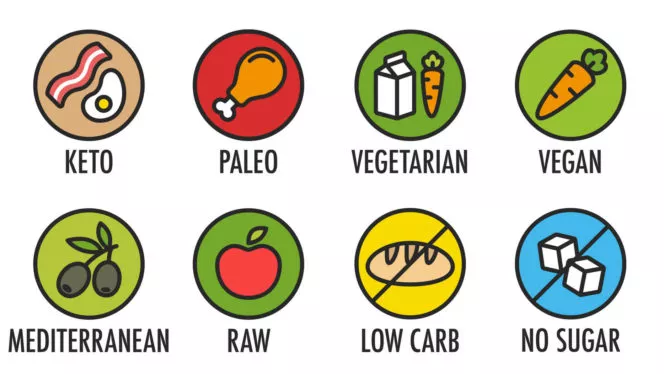
A new study from Tulane University has found that popular diets like keto and paleo may not only be unhealthy, but also have a negative impact on the environment. According to the study, published in The American Journal of Clinical Nutrition, these diets scored low on nutritional quality and were among the highest in carbon emissions. In contrast, a vegan diet was found to be the least impactful on climate.
The study analyzed data from more than 16,000 adult diets collected by the CDC’s National Health and Nutrition Examination Survey. Each diet was assigned a point value based on the federal Healthy Eating Index (HEI), and average scores were calculated for each type of diet. Average daily greenhouse gas emissions in kilograms of carbon dioxide equivalents per 1000 calories were calculated for each diet using a previously developed database.
The keto diet, which prioritizes high amounts of fat and low amounts of carbs, had an estimated carbon footprint of almost 3 kg of carbon dioxide for every 1,000 calories consumed. The paleo diet, which avoids grains and beans in favor of meats, nuts, and vegetables, had a carbon footprint of 2.6 kg of carbon dioxide per 1,000 calories.
Vegan, vegetarian, and pescatarian diets: more sustainable options
In contrast, the researchers found the vegan diet is the most sustainable and least impactful on climate, generating only 0.7 kg of carbon dioxide per 1,000 calories — four times less than paleo. Vegetarian and pescatarian diets followed closely behind, in terms of carbon emissions. From a nutritional standpoint, the pescatarian diet — which adds fish and seafood to a vegetarian diet — was the healthiest, followed by vegetarian and vegan diets.
| Diet Type | Carbon Footprint (kg CO2-eq/1000 kcal) |
Standard Error | Mean HEI Score |
|---|---|---|---|
| Vegan | 0.69 | 0.05 | 51.65 ± 2.58 |
| Vegetarian | 1.16 | 0.02 | 51.89 ± 0.74 |
| Pescatarian | 1.66 | 0.04 | 58.76 ± 0.79 |
| Omnivore | 2.23 | 0.01 | 48.92 ± 0.33 |
| Paleo | 2.62 | 0.33 | 36.13 ± 1.91 |
| Keto | 2.91 | 0.27 | 43.69 ± 1.61 |
The omnivorous diet: somewhere in the middle
The omnivorous diet, which is the most common diet in the US, sat in the middle of the pack of both quality and sustainability. The study suggests that if a third of those on omnivore diets started eating a vegetarian diet, it would be equivalent to eliminating 340 million passenger vehicle miles. Moreover, when those on omnivorous diets opted for plant-forward Mediterranean or fatty meat-limiting DASH diet versions, both carbon footprints and nutritional quality scores improved. The Mediterranean diet promotes more seafood, plant protein foods, fruits and vegetables, and less red and processed meats, whereas the DASH diet recommends less saturated fat and total fat, and more fiber.
The study’s senior author, Diego Rose, said that “climate change is arguably one of the most pressing problems of our time, and a lot of people are interested in moving to a plant-based diet. Based on our results, that would reduce your footprint and be generally healthy. Our research also shows there’s a way to improve your health and footprint without giving up meat entirely.”
The study’s findings are significant given that 34% of greenhouse gas emissions come from the food system. While the environmental impacts of specific foods have been studied extensively, this study is important because it considers how individuals select popular diets that are composed of a wide variety of foods.
Rose believes that the study raises important questions about how to encourage eating habits that are better for people and the planet. He suggests that policymakers consider how different policies could affect outcomes and move us towards healthier, more environmentally friendly diets.
The study highlights the significant impact that popular diets have on the environment. It shows that keto and paleo are quite bad both from a nutritional and environmental standpoint. Luckily not too many people adhere to these diets — just 0.4% of Americans are on Keto and 0.3% are on Paleo, compared to 0.7% vegan, 4.7% pescatarian, 7.5% vegetarian, and 86% omnivore diets.
Source: zmescience.com





















Add comment